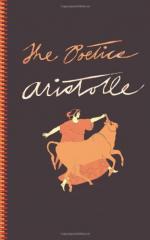
|
| Name: _________________________ | Period: ___________________ |
This quiz consists of 5 multiple choice and 5 short answer questions through Section I.
Multiple Choice Questions
1. In the context of poetry and according to Aristotle's teachings, why is man naturally attracted to imitation?
(a) Imitation is a form of acting.
(b) It is through imitation that man most easily learns.
(c) It is a lot of fun.
(d) Imitation is less expensive.
2. In poetry, Aristotle explains that the "Recognition" is almost always what?
(a) A surprise.
(b) A tragedy.
(c) Between two characters.
(d) The end of the poem.
3. Aristotle believes that a poet can turn a complex plot into a simple one by doing what?
(a) Adding more character flaws.
(b) Eliminating recognition and/or reversal of situation.
(c) Focus.
(d) Hard work and dedication.
4. According to Aristotle, why do good poets sometimes write stories using episodic plots?
(a) To showcase their skills in contests.
(b) They never write stories using episodic plots.
(c) For the challenge.
(d) Because episodic plots are considered more interesting.
5. What does Aristotle consider to be secondary to the most essential element of tragedy?
(a) Development of imitation.
(b) Development of irony.
(c) Development of rhyme.
(d) Development of character.
Short Answer Questions
1. How does Aristotle say the different types of poetry emerged?
2. Concerning the "laws of probability and necessity," what statement below is NOT correct according to Aristotle's teachings in "Poetics"?
3. What type of story does Aristotle define as "episodic"?
4. When one character realizes that another character has fewer morals than he once thought, what does Aristotle say is happening?
5. Aristotle states that poetry depicts what?
|
This section contains 327 words (approx. 2 pages at 300 words per page) |

|




